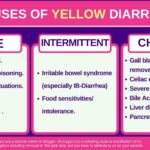Dark Green Poop: 6 Causes Explained.
Our content is not intended nor recommended as a substitute for medical advice by your doctor. Use for informational purposes only.
Dark green poop without diarrhea is often due to dietary factors such as green leafy vegetables, green dye, and iron supplements. However, if diarrhea presents, The dark color may be due to unchanged bile in stool in severe cases of diarrhea.
This article will discuss the possible causes of dark green poop. Each of the causes will be explained in-depth to help you figure out your cause.
The most important question to ask is about diarrhea. The green color of diarrhea can be due to severe attacks of diarrhea that lead to the passage of unchanged dark green poop.
The causes of dark green poop include:
- Overeating green leafy vegetables such as broccoli and spinach.
- Artificial colorings such as greenish ice pops.
- Severe forms of acute diarrhea (viral, bacterial, or protozoal infections).
- Antibiotic-associated diarrhea.
- Severe forms of chronic diarrhea include severe IBS-diarrhea, IBD, bile acid diarrhea, and others.
- Recent gallbladder surgery.
- Newborn poop (meconium).
- Postcholecystectomy diarrhea.
How does your poop become dark green?
The normal stool color is brown. However, all shades of brown, such as dark brown or light brown poop, are considered normal variations.
The dark brown color of the stool is due to the consistent breakdown of Hemoglobin inside RBCs to bilirubin. Bacteria further act on bilirubin products in the digestive system, giving rise to stercobilin. Stercobilin is an end product of bilirubin that gives the stool its brown color.
The stool becomes dark green by either:
- Speeding up of intestinal contents {severe diarrhea}: extreme forms of diarrhea leads to the passage of dark green bile as it has no time to be processed to its standard brown color.
- Dark green food.
- Green food additives and stains.
- Iron supplements {very dark green or black stool}.
1 . Green leafy vegetables.
Green leafy vegetables contain a dark green substance called Chlorophyll. Therefore, eating too many green leafy vegetables can lead to dark green poop.
The poop color change is directly proportional to the amount you eat.
Causes include:
- Spinach
- Kale
- Cabbage.
- Beet greens
- Romaine Lettuce.
- Blueberries.
Symptoms:
- Greenie foods are a common cause of dark green poop. In such a case, the color of your poop is not a cause of concern.
- History of eating a significant amount of dark green leafy vegetables before the appearance of dark green poop (hours to days before).
- Absence of diarrhea (well-formed stool).
- The dark green poop goes away within a few days, and the poop returns to its standard brown color.
- Absence of other signs of digestive issues such as abdominal pain, diarrhea, nausea, etc.
The dark green poop without diarrhea or other symptoms is probably due to dietary changes. Therefore, it is not a cause of concern. No action is needed unless it continues.
See a doctor if you have diarrhea with dark green poop or when the poop color doesn’t revert to its standard color.
2. Food colorings.
Dark green dyes can also lead to dark green poop when consumed excessively.
They cause symptomless dark green poop with no other digestive issues like green vegetables.
Examples:
- Dyes or color additives used in AIcohoIic drinks.
- Green-colored ice pops.
- Green-colored sodas and soft drinks.
- Drink mixes.
- Natural dyes, such as green grapes, cucumber, etc.
- Supplements such as oral iron
3. Digestive system infections (Dark green diarrhea or bile poop).
Acute digestive system infections lead to diarrhea and speed up intestine and colon contents.
The frequent severe attacks of diarrhea eventually lead to dark green watery poop.
The green color of severe diarrhea is often due to the passage of unchanged greenish bile.
Causes include (reference):
| Viral: 50%–70% | Bacterial: 15%–20% | Parasitic: 10%–15% |
|---|---|---|
| Norovirus | Shigella | Giardia |
| Rotavirus | Salmonella | Amebiasis |
| Enteric adenovirus types 40 and 41 | Campylobacter | Cryptosporidium |
| Astrovirus | E Coli | Isospora |
| Coronavirus | Vibrio | Cyclospora |
| Some picornaviruses | Yersinia | Microsporidium |
| C difficile |
Whether viral, bacterial, or protozoal, the presence of dark green poop depends on the severity of diarrhea rather than the type of the organism.
Infection is often acquired by contact with an infected person or surface.
Also, the infection can be due to food contamination with the organisms or their toxins (foodborne illness or food poisoning).
The more severe diarrhea, the more likely to have dark green poop.
Symptoms of acute gastroenteritis:
- Sudden onset abdominal cramps.
- Nausea and vomiting.
- Sudden onset of diarrhea. The diarrhea is often watery and yellow at first.
- With frequent attacks of watery diarrhea, The poop eventually becomes dark green due to the passage of unchanged green bile.
- Dark green poop may indicate severity and lead to dehydration, especially in aged extremities (children and older people).
- Fatigue and body aches.
- Fever may be present (low-grade in viral gastroenteritis and high-grade in bacterial gastroenteritis.
- Signs of dehydration may occur in severe cases, such as extreme thirst, dry tongue, peeing too little urine, deep yellow urine, dizziness, shortness of breath, and fast heartbeat. Confusion and coma occur in severe cases of dehydration, particularly in babies and older adults.
4. Antibiotic-associated diarrhea.
Recent antibiotic use may cause diarrhea. This is because antibiotics may affect the normal bacteria inside your digestive system.
Antibiotic-associated diarrhea can be severe, leading to dark green poop due to unchanged bile.
Call your doctor if you have a recent history of antibiotic intake followed by severe diarrhea and dark green poop.
The condition is often treated by stopping the offending drug. Also, Probiotics may be needed (liver bacteria that restore the normal gut flora).
5. Severe forms of chronic diarrhea.
Diarrhea that lasts for persists more than four weeks are called chronic diarrhea.
Severe forms of chronic diarrhea lead to dark green poop. Milder cases of chronic diarrhea are often light-brown or yellowish. The dark green color is often a sign of severity.
Common causes include:
- Chronic digestive system infections such as recurrent Clostridioides difficile infection.
- Severe forms of diarrhea-predominant irritable bowel syndrome.
- Celiac disease.
- Inflammatory bowel diseases (Crohn’s disease, ulcerative colitis, and microscopic colitis).
- Food intolerances (particularly lactose intolerance).
- Small intestinal bacterial overgrowth (SIBO).
- Chronic pancreatitis.
- Hyperthyroidism.
- Colorectal cancer or neuroendocrine tumors such as carcinoid and VIPoma.
- Diabetes-related diarrhea.
- Cystic fibrosis.
- And others.
Any cause of severe acute diarrhea can lead to dark green poop. However, milder forms of diarrhea for any reason often don’t cause the dark green color of poop.
Dark green poop without diarrhea doesn’t occur with such diseases.
6. Recent gallbladder removal (postcholecystectomy diarrhea).
The gallbladder is a sac-like organ attached to your liver. Its primary function is to store bile and excrete it into the small intestine when needed (after meals).
Severe diarrhea may occur when the gallbladder is removed (often due to gallstones or acute cholecystitis).
The diarrhea is often due to loss of the storage function of the gallbladder, leading to excess bile in the intestine.
One in every five persons undergoing cholecystectomy suffers from postcholecystectomy diarrhea.
Postcholecystectomy diarrhea is often due to bile acid malabsorption (secondary to increased bile acid secretion to the digestive tract).
Diarrhea often resolves within weeks to a few months after gallbladder removal. However, Some may continue to suffer for years.
Dark green poop from postcholecystectomy diarrhea may respond to bile acid binders such as cholestyramine (Questran®). Consult your doctor if your dark green poop is linked to previous gallbladder surgery.
7. Dark green poop in newborns and babies.
Dark green poop is entirely normal in newborn babies. Newborn babies pass a characteristic tar-like, odorless, dark green poop called meconium.
The meconium is a normal finding in newborns after the first two to three days.
Moreover, breastfed babies under two years of age frequently have dark green poop due to various causes as:
- Attacks of diarrhea in babies are often more severe and more likely to end in dark green poop than in adults.
- Breastfeeding (foremilk/hindmilk imbalance).
- The introduction of new foods such as green vegetables.
- Food allergies or intolerances.
- Formula feeding may cause dark green poop.
When to see a doctor for dark green poop?
Occasional dark green poop is an occasional finding (especially in babies). However, there is no need to worry if the dark green poop is not associated with other digestive symptoms such as abdominal pain, fever, or fever.
- Dark green poop that is associated with severe diarrhea (especially in babies)
- Prolonged periods of dark green poop for more than days without apparent cause.
- Abdominal pain.
- Nausea or vomiting.
- Sings of dehydration include extreme thirst, peeing little urine, dark urine, confusion, or coma.
- Fever.
- Presence of blood in the stool.
MORE:
- Why is Your Poop Green & Stomach Hurts? 6 Causes.
- Is Green Poop a Sign of Covid-19? 6 Essential Facts.
- Evidence-based
- Written by a doctor.






